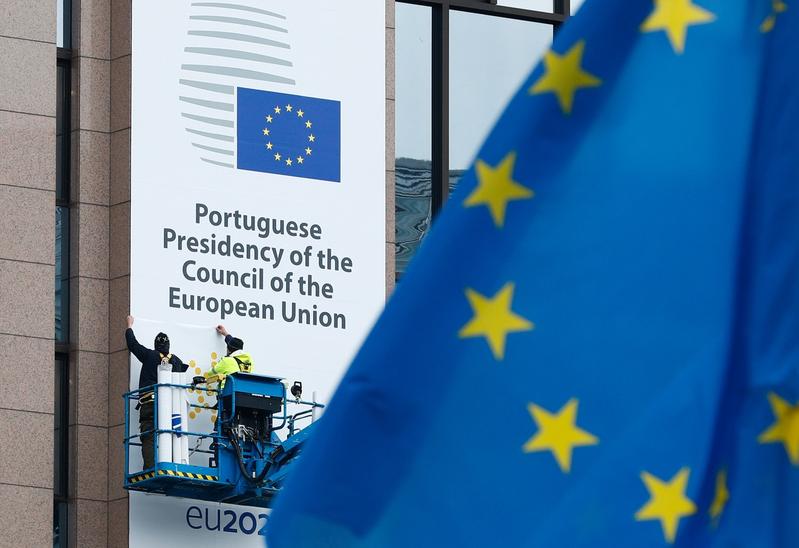 Signage for Portugal's presidency of the EU Council goes up in Brussels on Monday. (PHOTO / XINHUA)
Signage for Portugal's presidency of the EU Council goes up in Brussels on Monday. (PHOTO / XINHUA)
European Union leaders pledged on Tuesday to push forward with the ratification of the China-EU Comprehensive Agreement on Investment, or CAI, as Portugal takes over from Germany with the presidency of the Council of the European Union in the first six months of 2021.
Chinese officials, such as the country's ambassador to the EU Zhang Ming, have repeatedly indicated that China and the EU are partners, not rivals
China and the EU concluded their negotiations in principle for the investment deal on Dec 30 after seven years of negotiations.
European Council President Charles Michel, who appeared in a news conference in Lisbon on Tuesday with Portuguese Prime Minister Antonio Costa, said the EU's strategic autonomy doesn't mean the bloc is turning inward; rather, it is pursuing an open economy.
"We have the agreement on investment with China," he said. "That's the whole issue of ratification now, of course, to consider over the next months."
Costa echoed Michel's views, saying the EU rejects protectionism and remains open to the world.
ALSO READ: China-EU investment treaty backed
"We also need to negotiate other important trade agreements with other players in the region such as Australia and New Zealand," he said.
In an interview with Portuguese News Agency Lusa, Costa dismissed the criticism by some that the bloc completed the CAI negotiations without consulting the United States.
In a tweet on Dec 22, Jake Sullivan, the US National Security adviser-designate for President-elect Joe Biden's administration, said: "The Biden-Harris administration would welcome early consultations with our European partners on our common concerns about China's economic practices."
The message was seen as telling the EU to delay the conclusion of the negotiations until the new US administration takes office on Jan 20.
"It's a process that was underway. It would also be a terrible signal for us to block this negotiation or to condition this negotiation according to others," Costa said in response to a question about whether the EU should have coordinated the negotiations with the US administration, the Brussels-based EURACTIV website, a partner of the Portuguese-language Lusa, reported.
"If Europe wants to be a global actor, as it has to be, its strategic autonomy depends on being able to speak with each of the other global actors," said Costa, who has been Portuguese prime minister since 2015.
On Tuesday, Sabine Weyand, the European Commission's director-general for trade, said she disagreed with the notion that the EU may have a trade strategy to deal with China as a business partner, but not a geopolitical strategy to deal with China as an emerging global power.
"I disagree with the assertion," she said in a tweet, adding that the EU's 2019 China Communication sets out a comprehensive strategy that treats China simultaneously as a negotiating partner, an economic competitor and a systemic rival.
Chinese officials, such as the country's ambassador to the EU Zhang Ming, have repeatedly indicated that China and the EU are partners, not rivals.
Weyand, a German senior EU official who participated in the CAI negotiations, said that the investment pact is an integral part of this strategy. "The EU has a unified China strategy of which CAI is one building block," she said.
Kevin Tellier, a hedge fund macro analyst and investor based in New York City, pointed out that the "US indignation toward being cut out of the loop is honestly comical".
READ MORE: China and EU set to improve global climate governance
"Did the US expect everyone to forget who started trade wars with both the EU and China in the first place," he wrote in a daily note.
He also mocked those China hawks in a tweet on Tuesday, saying: "The hawks remind me of a sulky child who wants dessert before dinner, but instead of dessert it's some vague notion of 'geopolitical interests'."
Gordon Orr, a nonexecutive board member of Swire Pacific, said in a tweet on Tuesday: "The investment agreement between EU and China covers many sectors and should create significant new opportunities for EU companies."


